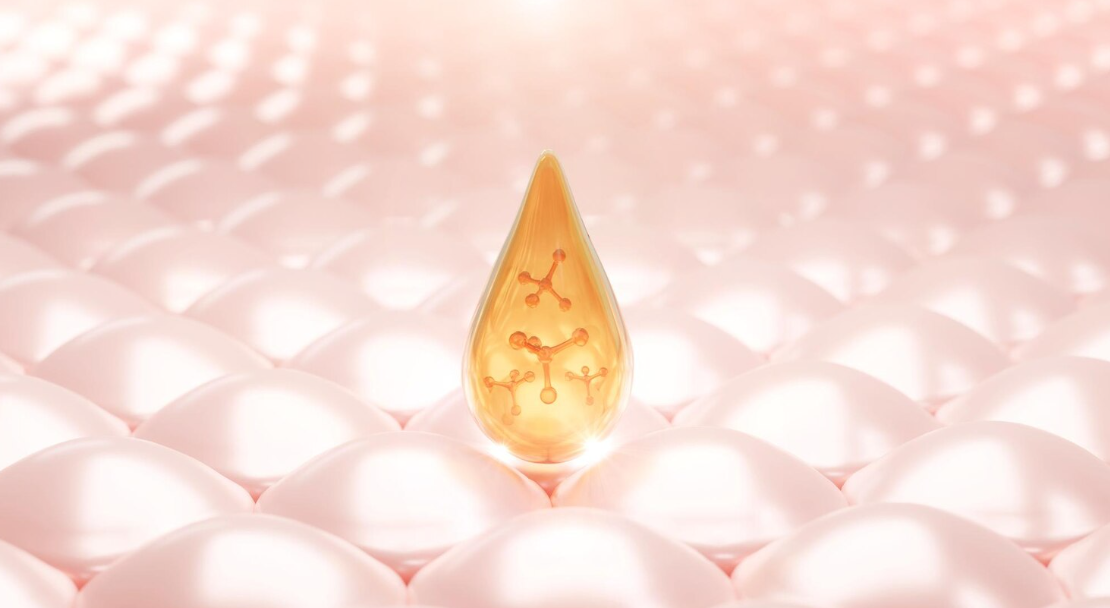Piper’s Transformative Journey with Anxiety Treatment at Unchained Wellness Clinic
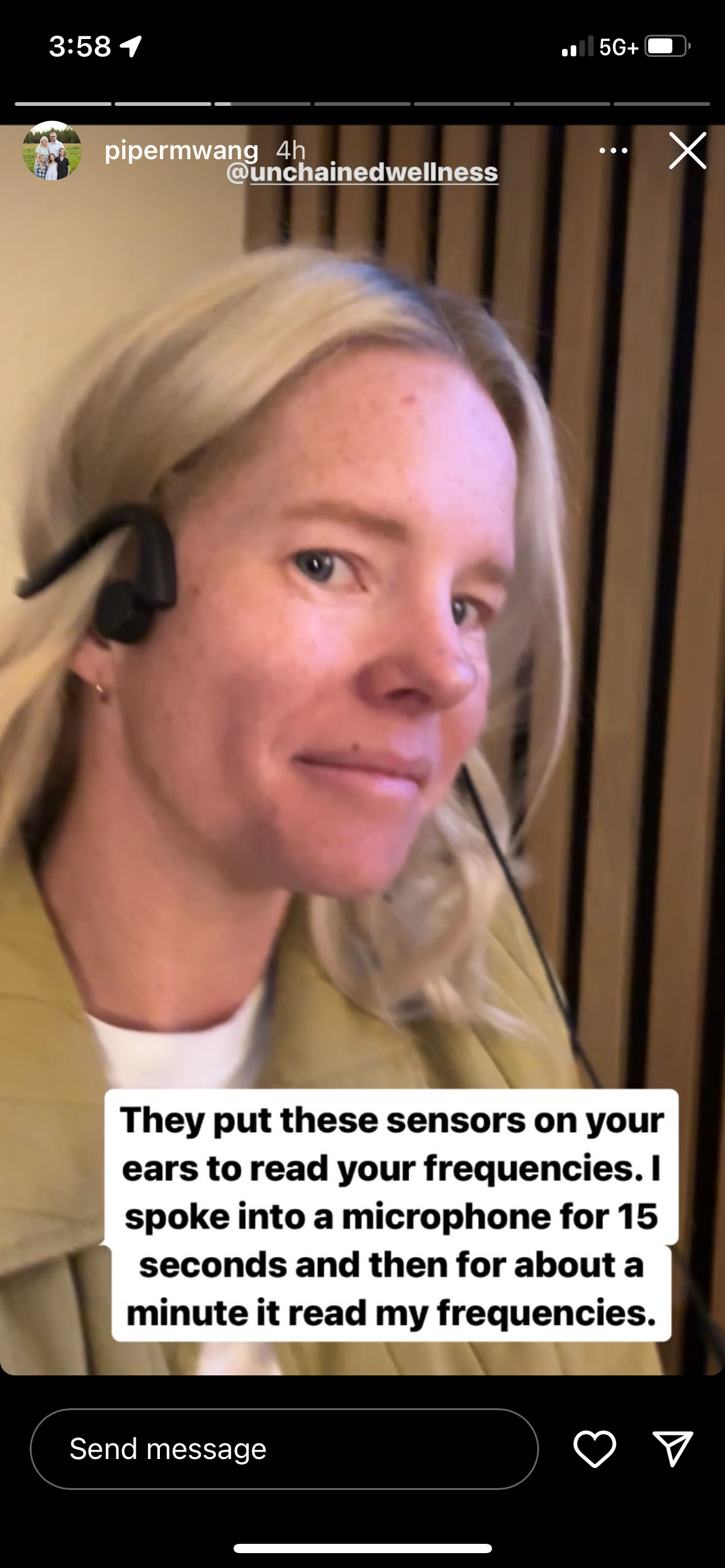
Navigation links
Free Consultation
It's important to know that you are not alone. Get help with depression today!
TMS THERAPY SUPPORTS MENTAL WELLNESS
- Depression
- Lack of Joy
- Sadness and Despair
- Low Mood
- Lethargy
- Insomnia
- Oversleeping
- Social Isolation
- Self-Harm
- Substance Abuse
- Suicidal Ideation
- Alcoholism
Piper’s Transformative Journey with Anxiety Treatment at Unchained Wellness Clinic
At Unchained Wellness Clinic in Gilbert, AZ, we are dedicated to providing innovative and effective treatments for anxiety and other health issues. Recently, one of our patients, Piper, shared her transformative experience at our clinic on her Instagram. Piper's journey highlights the profound impact our services, including the Theta Chamber, can have on anxiety treatment. Here's a detailed look at her story and how Unchained Wellness Clinic can help others seeking anxiety treatment in Gilbert, AZ.
Discovering Unchained Wellness Clinic
Piper had been following Unchained Wellness Clinic since its inception, drawn by our holistic approach to health and wellness. She shared, "I have followed Unchained Wellness since they began because so many of their goals with personal health and wellness match my own." Like many, Piper found that the demands of life were taking a toll on her health, particularly her ability to manage anxiety.
"As my kids get older and busier, I have found that my health has taken a backseat, and it's beginning to catch up with me. I have been dealing with health issues as well as feeling like my anxiety is less easily managed on my own," she explained. Recognizing the need for professional support, Piper made an appointment with us, stating, "I decided to listen to my body more and make an appointment with Unchained, and I loved it!"
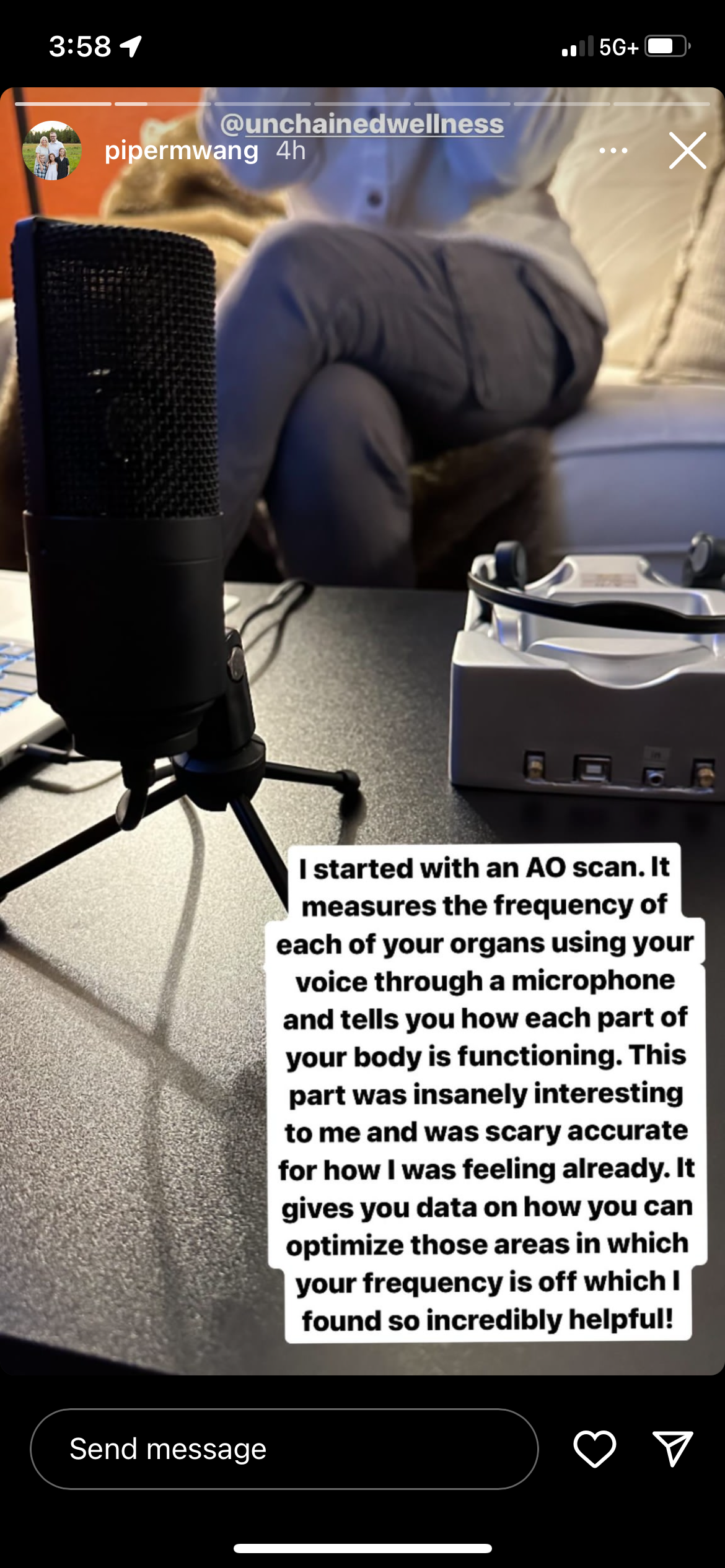
THE AO SCAN: A COMPREHENSIVE HEALTH ASSESSMENT
Piper's journey began with an AO scan, a revolutionary tool that measures the frequency of each organ using the patient's voice. Piper found this experience both fascinating and revealing: "I started with an AO scan. It measures the frequency of each of your organs using your voice through a microphone and tells you how each part of your body is functioning. This part was insanely interesting to me and was scary accurate for how I was feeling already."
During the scan, Piper discovered several underlying health issues, including thyroid imbalances, chronic Epstein-Barr, asthma, heart palpitations, and exposure to paint fumes. "My scan detected that my thyroid levels were off, that I had chronic Epstein-Barr, that I had asthma and heart palpitations, and that I had been exposed to paint which I have been painting my house among other things!" she shared.
Our practitioner, Christina, administered the scan and provided Piper with nutritional and supplemental advice to address these issues. "Christina administered my scan and after gave me some nutritional and supplemental advice that would help in the areas where I was struggling," Piper noted.
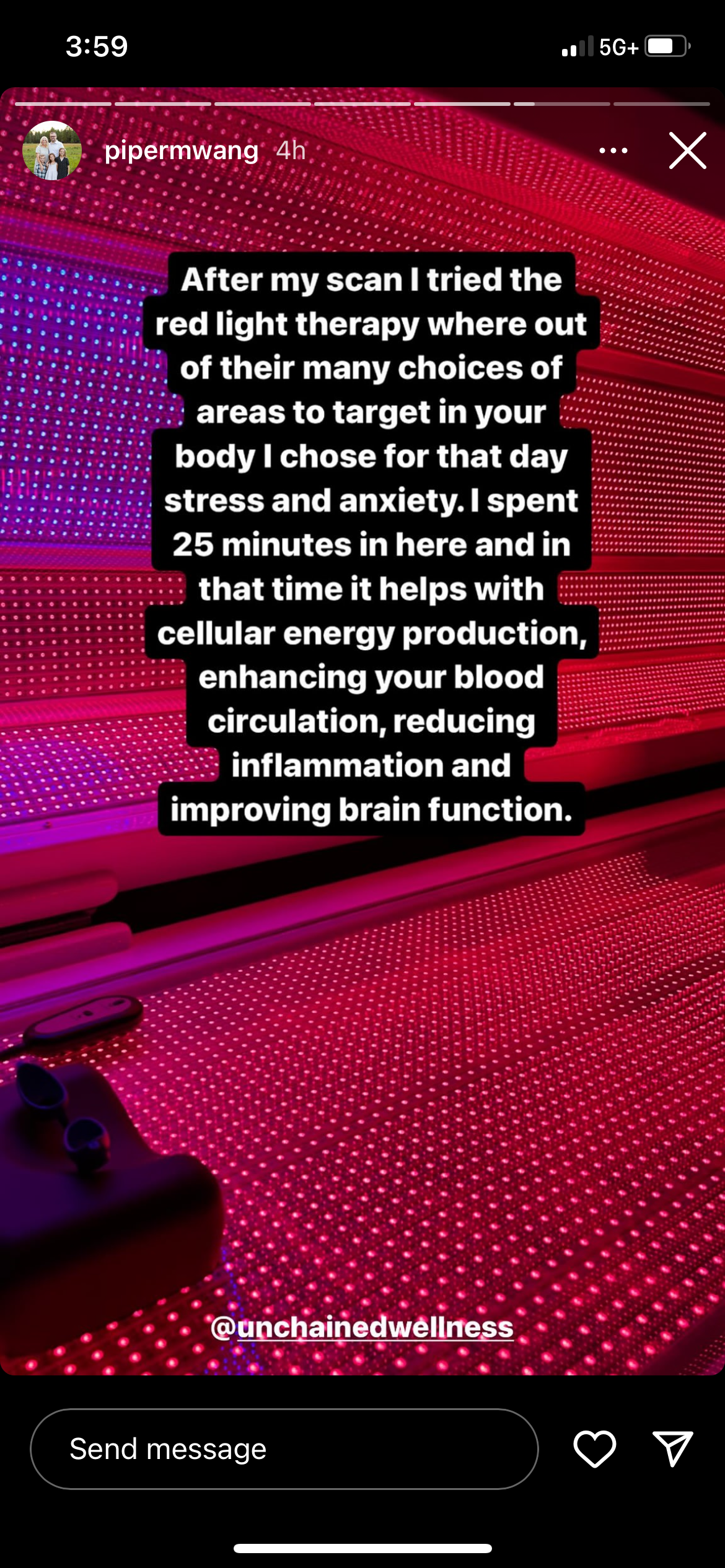
RED LIGHT THERAPY: TARGETING STRESS AND ANXIETY
Following the AO scan, Piper experienced red light therapy, choosing to focus on stress and anxiety. "After my scan, I tried the red light therapy where out of their many choices of areas to target in your body, I chose for that day stress and anxiety," she shared. Piper spent 25 minutes in the red light therapy session, which helped enhance cellular energy production, improve blood circulation, reduce inflammation, and boost brain function.
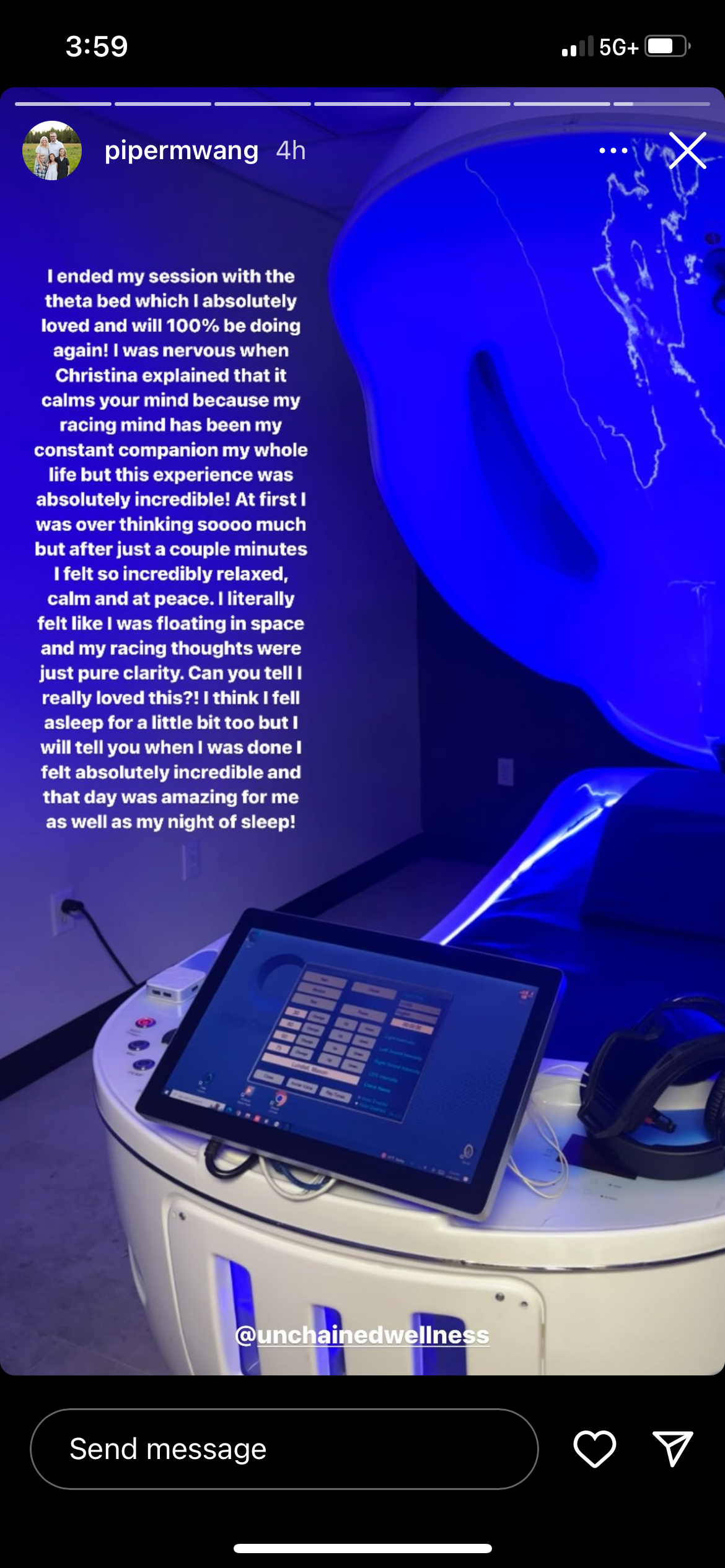
THE THETA CHAMBER EXPERIENCE
One of the highlights of Piper's visit was the Theta Chamber, a state-of-the-art device designed to promote deep relaxation and mental clarity. Despite initial nervousness, Piper was amazed by the results: "I ended my session with the theta bed which I absolutely loved and will 100% be doing again! I was nervous when Christina explained that it calms your mind because my racing mind has been my constant companion my whole life but this experience was absolutely incredible!"
Piper described the transformative experience in vivid detail: "At first, I was overthinking soooo much but after just a couple minutes I felt so incredibly relaxed, calm, and at peace. I literally felt like I was floating in space and my racing thoughts were just pure clarity." She even mentioned dozing off during the session and waking up feeling revitalized. "I think I fell asleep for a little bit too but I will tell you when I was done I felt absolutely incredible and that day was amazing for me as well as my night of sleep!"
CONCLUSION
Piper's journey at Unchained Wellness Clinic showcases the powerful impact of our holistic treatments on managing anxiety and improving overall health. From the comprehensive AO scan to the soothing red light therapy and the deeply relaxing Theta Chamber, Piper's experience underscores the benefits of seeking anxiety treatment in Gilbert, AZ, at Unchained Wellness Clinic.
If you or someone you know is struggling with anxiety, we invite you to discover the transformative services at Unchained Wellness Clinic. Our dedicated team is here to support you on your path to wellness, offering personalized care and innovative treatments tailored to your unique needs.
ANXIETY TREATMENT IN GILBERT AZ, THETA CHAMBER IN GILBERT AZ
At Unchained Wellness Clinic, we are proud to offer advanced anxiety treatment in Gilbert, AZ. One of our most effective treatments is the Theta Chamber, which Piper found incredibly beneficial. If you're searching for effective anxiety treatment in Gilbert, AZ, or interested in trying the Theta Chamber in Gilbert, AZ, Unchained Wellness Clinic is here to help.


